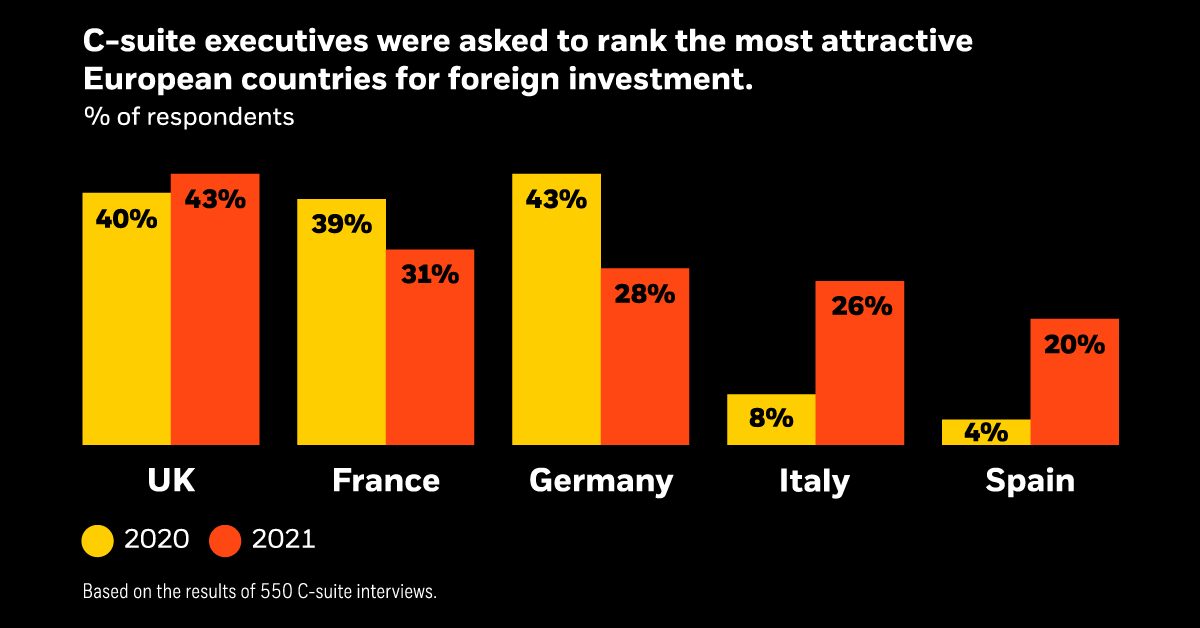Four Reasons to Watch UK Equities
The following content is sponsored by BlackRock.
Over the past several years, UK equities have traded at a relative discount compared to other developed markets. This was largely due to ongoing Brexit negotiations, where uncertainty around trade deals and other legislation created significant headwinds.
Fast forward to today, and much of the uncertainty has passed. Does this mean it’s time to invest in the UK?
Looking Ahead
This infographic from BlackRock covers four reasons for why investors should consider an allocation to UK equities.

So, why should investors consider an allocation to UK equities?
#1: The UK Market Is Not the UK Economy
The UK equity market is represented by many leading multinational companies from a variety of sectors.
For example, consider the FTSE All-Share Index, which contains over 600 companies listed on the London Stock Exchange. As of March 31, 2021, 72.5% of these companies’ total revenue was derived from outside of the UK.
A large share of overseas revenue provides investors with exposure to a range of global themes, where outcomes are not dictated by the UK economy itself.
#2: Business Activity is Ramping Up
The confirmation of a Brexit trade deal has provided UK companies with clarity around the rules of engagement, as well as the confidence to look ahead.
As a result, the UK has been ranked as the most attractive place in Europe for future investment.
| Country | Which country do you believe will be the most attractive for foreign investment in 2021? (% of respondents) |
|---|---|
| UK | 43% |
| France | 31% |
| Germany | 28% |
| Italy | 26% |
| Spain | 20% |
Based on the results of 550 C-suite interviews. Source: EY (2021)
This optimism has also spread to the UK equity market, where initial public offering (IPO) issuance in the first half of 2021 has already exceeded the entirety of 2020.
| Year | Number of IPOs | Money Raised |
|---|---|---|
| First half of 2021 | 47 | £3.5 billion |
| 2020 | 35 | £3.1 billion |
| 2019 | 33 | £2.9 billion |
Source: London Stock Exchange (2021)
Among those 47 IPOs were a number of high profile tech companies including Moonpig (online greeting cards), Darktrace (cybersecurity), and Deliveroo (food delivery).
The UK’s venture capital scene is also thriving, with U.S.-based Sequoia opening its first European office in London. Sequoia was an early investor in world-class businesses such as Apple, Google, and Airbnb.
#3: UK Firms are ESG Leaders
UK companies have historically been early adopters of environmental, social, and governance (ESG) practices. In fact, 45% of FTSE 100 companies have begun integrating ESG metrics into their executive compensation schemes.
UK firms are also leaders in gender diversity, consistently tracking ahead of other developed markets.
| Year | % Director Seats Held by Women (UK) | % Director Seats Held by Women (MSCI World Index) |
|---|---|---|
| 2016 | 25.3% | 19.1% |
| 2017 | 26.8% | 20.4% |
| 2018 | 29.1% | 21.6% |
| 2019 | 31.7% | 25.0% |
| 2020 | 34.3% | 26.2% |
Source: MSCI (2020)
This leadership may bring further interest to the UK equity market, especially as awareness around social issues continues to rise.
#4: UK Equities Can be a Compelling Source of Income
Over a 10-year time frame, UK dividends rates have exceeded those of other global markets.
| Country/Region | Dividend Yield (as of Sept. 30, 2021) | Dividend Yield (10-year median) |
|---|---|---|
| UK | 3.7% | 3.9% |
| Eurozone | 2.2% | 3.2% |
| Japan | 2.0% | 2.1% |
| EM | 2.2% | 2.7% |
| World | 1.7% | 2.5% |
| U.S. | 1.4% | 2.0% |
Source: Barclays Research, Refinitive (2021)
This outperformance even lasted through the COVID-19 pandemic, when dividend rates around the world were rebased (a term used for dividend cuts).
Beware of Zombies
While these factors provide UK equities with an attractive backdrop, the presence of zombie companies has dragged down the performance of the overall market.
Zombie companies are ones that are close to insolvency and do not generate enough profits to pay off their debts. Their survival is only made possible due to record low interest rates, which allows them to continue borrowing instead of shutting down.
So how many zombie firms are operating in the UK equity market?
According to Onward, a UK-based think tank, roughly one-in-five UK companies had become zombified in March 2020. Because of this, investors may find an actively managed approach to be beneficial. Unlike an index ETF, actively managed funds have the ability to avoid unprofitable businesses.
-

 Sponsored3 years ago
Sponsored3 years agoMore Than Precious: Silver’s Role in the New Energy Era (Part 3 of 3)
Long known as a precious metal, silver in solar and EV technologies will redefine its role and importance to a greener economy.
-

 Sponsored7 years ago
Sponsored7 years agoThe History and Evolution of the Video Games Market
Everything from Pong to the rise of mobile gaming and AR/VR. Learn about the $100 billion video games market in this giant infographic.
-

 Sponsored8 years ago
Sponsored8 years agoThe Extraordinary Raw Materials in an iPhone 6s
Over 700 million iPhones have now been sold, but the iPhone would not exist if it were not for the raw materials that make the technology...
-

 Sponsored8 years ago
Sponsored8 years agoThe Industrial Internet, and How It’s Revolutionizing Mining
The convergence of the global industrial sector with big data and the internet of things, or the Industrial Internet, will revolutionize how mining works.


